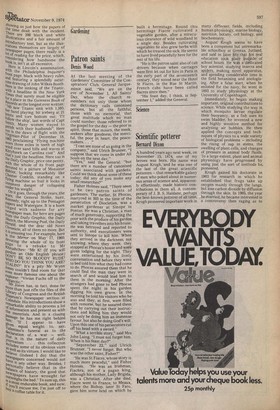Patron saints
Denis Wood
At the last meeting of the Gardeners' Committee of the Conspirators' Club, General Jacqueminot said, "We are on the eve of November 1, All Saints' Day, when the church remembers not only those whom the dictionary calls canonised persons, but all the faithful, those with no memorial, that great multitude which no man could number; those referred to in the gospel for the day — the poor in spirit, those that mourn, the meek, seekers after goodness, the merciful, the poor in heart, the peacemakers.. . ."
"I can see none of us going in the company," said Ulrich Brunner, "I suppose that we come in under All Souls on the next day." "Yes," said the General. "but there are a number of canonised saints associated with gardens. Could we think about some of these today; did any of you make any small researches?"
Fisher Holmes said, "There seem to be two patron saints of gardeners. The earlier, St Phocas, martyred in 303 in the time of the persecution of Diocletian, was a market gardener at Sinope in Pontus. He was a Christian, a man of much generosity, supporting the poor with the produce of his garden and taking travellers into his house. He was betrayed and reported to authority, and executioners were sent to Sinope to kill him. When they arrived in the darkness, not knowing where they were, they stopped at Phocas's house and were given lodging for the night. They were entertained by his lively conversation and before they went to bed told him what they had come to do. Phocas assured them that he could find the man they were in search of and would lead him to them in the morning. After the strangers had gone to bed Phocas spent the night in his garden digging his own grave. In the morning he told his visitors who he was and they, at first, were filled with remorse, but he assured them that by carrying out their instructions and killing him they would not only be doing him an immense favour, but also be doing God's will. Upon this one of his persecutors cut off his head with a sword."
"What a terrible story," said Mrs John Laing. "I must not forget him. When is his feast day?" "September. 22," said Ulrich Brunner. "I never forget. But who was the other saint, Fisher?"
"He was St Fiacre, whose story is much more peaceful," said Fisher Holmes. "He was an Irishman, Fiachra, son of a pagan king, although his mother, Lady Brigida, was a Christian. After she died, Fiacre went to France, to Meaux, where the Bishop, later St Faro, gave him some land on which he built a hermitage. Round this hermitage Fiacre cultivated a vegetable garden, after a miraculous clearance of wild woodland in a single day. Besides cultivating vegetables he also grew herbs with which he treated the sick. He seems to have lived peacefully here for the rest of his life. "He is the patron saint also of cab drivers because when carriages were first let out for hire in Paris in the early part of the seventeenth century, they s000d near the Hotel St Fiacre, in the Rue St Martin. French cabs have been called fiacres since then."
"His feast day, I think, is September I," added the General.


































 Previous page
Previous page